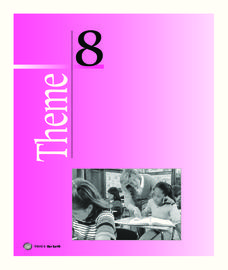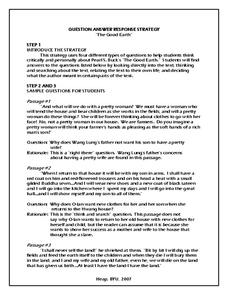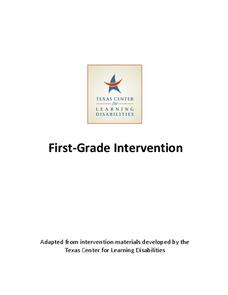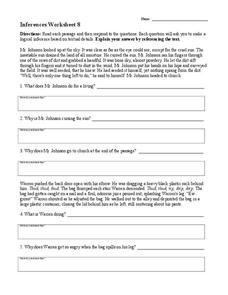Houghton Mifflin Harcourt
Journeys: Challenge Activities (Theme 1)
This nine-page packet, the first in the series of support materials for the Houghton Mifflin Harcourt thematic units on journeys, contains enrichment activities for learners who have mastered the basic concepts of the lessons. Kids...
Houghton Mifflin Harcourt
Our Earth: English Language Development Lessons (Theme 8)
Language learners receive support with the concepts in the Houghton Mifflin Harcourt thematic unit Our Earth from this 32-page packet of exercises and activities designed just for them
Houghton Mifflin Harcourt
Our Earth: Challenge Activities (Theme 8)
This packet, the first in the series of support materials for the Houghton Mifflin Harcourt thematic units on our earth, contains enrichment activities for learners who have mastered the basic concepts of the lessons. Kids create a...
Houghton Mifflin Harcourt
Silly Stories: Extra Support Lessons (Theme 1)
Kids who need extra support with the concepts in the Houghton Mifflin Harcourt thematic unit on silly stories, will benefit from this packet packed with skill builders, activities, exercises, and practice sets.
Houghton Mifflin Harcourt
American Stories: Extra Support Lessons (Theme 2)
Here's a packet designed especially for those kids who need extra support with the basic concepts in the Houghton Mifflin Harcourt thematic units on American stories.
Texas Center for Learning Disabilities
Fourth-Grade Text-Based Intervention
Provide young readers with the extra support they need using this series of 10 literacy lessons. Following a repeated sequence of learning activities, these lessons engage children in expanding their vocabulary and developing their...
Texas Center for Learning Disabilities
Second and Third Grade Explicit Phonics Intervention
Support all young learners on their journey to literacy with this five-lesson reading intervention unit. Following a clearly outlined format, each lesson first engages children in practicing their phonemic awareness and phonics skills...
Texas Center for Learning Disabilities
Second-Grade Comprehension-Based Intervention
Help your youngsters find meaning in the text they read with this series of five intervention lessons. Offering explicit, step-by-step instructions for walking children through shared readings of leveled books, these...
Reading Resource
/oi/ Word List
Spoil, brown, poison. Designed to help develop phonemic awareness, the conscious awareness of the sound structure of words, readers are asked to identify and highlight the /oi/ sound in a list of 30 words. They then practice reading...
Novelinks
The Chosen: QAR
Question the text with a reading comprehension activity based on Chaim Potok's The Chosen. Learners read four passages from the book and decide if the question after each passage is between the reader and the author, for the reader to...
Novelinks
The Good Earth: Question Answer Response Strategy
Readers of Pearl Buck's The Good Earth craft and answer "Right There," "Think and Search," "On Your Own," and "Author and You" questions.
Novelinks
The Hitchhiker’s Guide to the Galaxy: Concept Analysis
Considering using Douglas Adams' The Hitchhiker's Guide to the Galaxy as a whole class reading or for book circles? Check out this overview that provides a plot summary, a list of enduring questions raise by and themes addressed by the...
Texas Center for Learning Disabilities
First-Grade Intervention
Learning how to read is a big challenge for young learners, but this series of lessons provides them with the extra support they need to succeed. With each lesson following the a clearly outlined format, children are introduced to new...
Novelinks
Nightjohn: Bloom's Taxonomy Questions
After completing Nightjohn, Gary Paulsen's young adult novel about slavery set shortly before the Civil War, readers respond to a series of questions crafted to reflect Bloom's taxonomy.
Novelinks
The Devil’s Arithmetic: QAR Strategy
Asking questions about the text is an important way for kids to become critical readers. Use a QAR activity based on The Devil's Arithmetic to help learners decipher between questions that are right there, between the author and the...
Do2Learn
Reading Form
Help kids keep track of their reading and comprehend literary texts with a straightforward graphic organizer. Pupils note down the setting and characters as well as four events from the text.
Reading Worksheets
Inferences Worksheet 10
After reading some of your learners' work and analyzing their literary analyses, you might infer that they need some practice with making inferences! Assign this exercise to support your pupils. They read four passages and make...
Reading Worksheets
Inferences Worksheet 9
Help your pupils take charge of their inferring abilities with an exercise designed for direct practice with making and supporting inferences. Learners read four short passages and answer two to three questions for each passage that...
Reading Worksheets
Inferences Worksheet 8
Lead your class toward mastery of making inferences with a straightforward worksheet. Pupils read four short passages and make inferences based on the questions asked about each passage. They explain their reasoning for each inference by...
Novelinks
Count of Monte Cristo: Anticipation Guide
Is love the strongest force in the world? Delve into the themes of The Count of Monte Cristo by Alexandre Dumas with an anticipation guide that introduces the main points of discussion. Kids mark their agreement or disagreement with ten...
Reading Worksheets
Inferences Worksheet 7
Hone your learners' inference-making skills with this exercise. The learning exercise includes four passages that learners read and answer questions about. Pupils must note down their inferences along with textual evidence that support...
Have Fun Teaching
Who Am I? (14)
What's the difference between a clown and a cashier? Use context clues to infer what each character does for a living in five different reading passages. Kids mark their choices on the space provided.
Reading Worksheets
Inferences Worksheet 6
Have your learners mastered making inferences? Have pupils work their inferring muscles by completing this worksheet, which includes four passages to read and analyze. Learners answer two to three questions about each passage, providing...
Have Fun Teaching
When Am I? (16)
How can you tell when a story takes place? Use context clues to infer the time of day and seasons of five short reading passages. Kids then note each passage's time period as daytime or nighttime, as well as winter or summer.

























